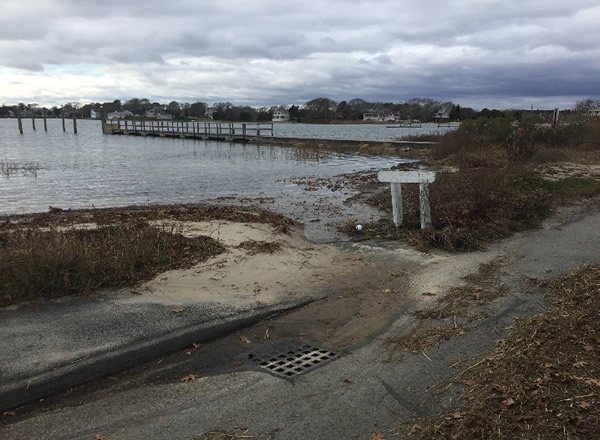Network Narratives: Coastal Resilience and Climate Finance in Bourne, Massachusetts
September 2021

Bourne, Massachusetts is the first town on the Cape Cod peninsula. And with 55 miles of coastline, Bourne is particularly vulnerable to climate risks. Town officials have long been aware of Bourne's precarious position. The Town already experiences flooding during rainy days and moon tides, and floodplain management tools show a dire forecast. Water quality—identified as the biggest issue in the Town's Local Comprehensive Plan — was predicted to get worse with increased flooding and sea-level rise. Like many towns of its size, Bourne described itself as "plan-heavy" but not "action-heavy." Town leaders often felt overwhelmed by how to take the next steps towards climate resilience.
In March 2020, Bourne sought technical assistance from the SNEP Network to improve its approach to green stormwater infrastructure. The SNEP Network was established in 2020 to provide no-cost technical assistance to SNEP communities and tribes. But after discussions with the SNEP Network , including its partner organization Throwe Environmental, LLC, Bourne realized a more comprehensive look at the Town's resiliency and climate financing strategy was needed. Over the course of the SNEP Network's technical assistance, the Throwe Environmental Project Team has helped Bourne leaders understand their challenges and refine their short-, mid-, and long-term goals. Town Engineer Timothy Lydon explained, "We'd get really in the weeds about local projects— [such as] one catch basin in front of one house that floods. Joanne [Throwe], Kyle [Gray, and the Throwe Environmental team] brought a holistic approach. They have a national view of coastal sea-level rise." For a small town like Bourne, that expertise helped them move beyond individual projects to focus on a comprehensive, whole-town view.
Bourne officials and the SNEP Network Project Team developed a two-phase approach: Phase 1 created a Coastal Resilience Action Strategy, using a Climate Toolkit to identify resilience priorities and construct a framework for a resilience enterprise fund. Work continues in Bourne on Phase 2, once again using Throwe Environmental's expertise in climate finance to mobilize long-term investment in support of the Town's climate resilience goals.
"Figuring out the problems is the easy part," said Lydon, "figuring out how to pay for them is the hard part." With limited funds and several projects competing for dollars, towns like Bourne often get stuck on how to pay for long-term resilience strategies. Climate finance is the long-term financial commitment and investment in mitigating and/or adapting to the risks of climate change. The Network team emphasized the importance of giving Bourne the tools to adapt to the climate risks they face through up-front investments before a disaster strikes.
Bourne officials were responsive to the climate finance approach, and they understood that investing now would lead to greater resiliency and economic prosperity in the future. Bourne's planning and prioritization will help bolster their bond rating, and their organized approach will help them access future state and federal funds. The Town hopes to put a mechanism like a revolving fund in place now to build funding over time. Taking a proactive, long-term investment approach is more cost-effective than waiting to borrow funds after a major problem occurs. Lydon hopes this project will demonstrate that municipalities can take on climate adaptation themselves, and that they don't need to rely on state or federal action to do so.
Project Lead Joanne Throwe lauded the town's willingness to be proactive, and emphasized the receptiveness of Bourne town staff: "There's something special happening with Bourne that makes our work so rewarding. Leadership at various levels is engaged and supportive of our work and our effort, and it makes all the difference. When we provide technical assistance, we're going to be successful because of their great attitude."
The connection between economic development and climate resilience is key to ensuring the future of coastal communities. Before this project, "I didn't typically sit down with the finance people to discuss financial planning," Lydon shared. The project connected financial and regulatory staff to meet the community's challenges head on, a model that he hopes will catch on in neighboring municipalities. "The SNEP Network helped us get here, and I can't say how grateful we are."
Network Narratives: Coastal Resilience and Climate Finance in Bourne, Massachusetts (pdf)
